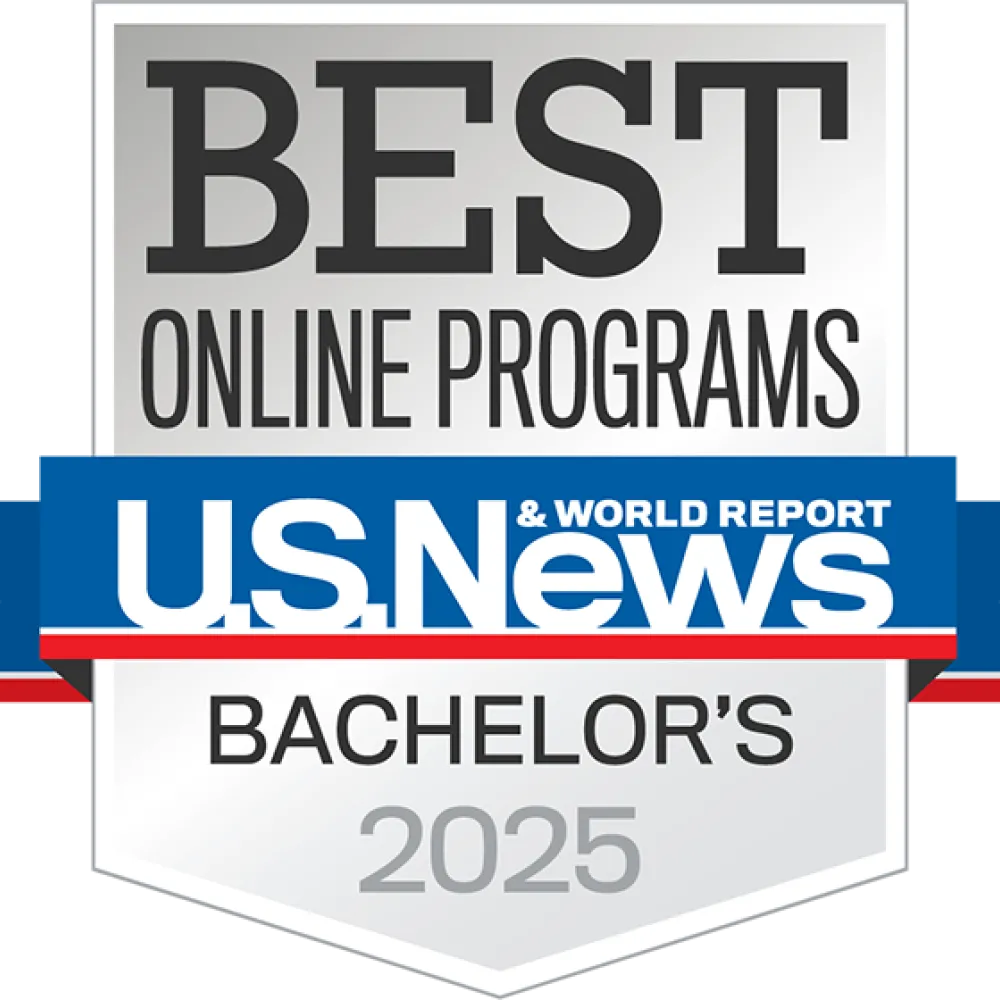Program highlights
| Accreditation | Accredited by the Higher Learning Commission |
|---|---|
| Format | 100% online classes |
| Degree pathways | Earn a 2-year degree and transfer credit into a BS-HHS, or pursue related bachelor's degree majors in allied health, nursing, business, or others |
| QuickPaths | Transfer credit, stackable credentials, and adaptive learning technology build a faster pathway to a higher education with Herzing University |
Learn More Today!

Satisfaction rate
Our overall student satisfaction rate, according to the 2024 Herzing Graduate Survey.
Associate of Science in Health and Human Services
The Associate of Science in Health and Human Services is a 60-credit undergraduate program which prepares you for a wide variety of potential career pathways in community health.
The online degree program provides students with fundamental knowledge and skills in human resource management, behavioral health in communities, social problems and policy, human development across the lifespan, and much more.

Career-focused curriculum
Discover the crucial knowledge and skills required to succeed in your work and build a foundation for continued career growth.
Flexible schedule
You can take classes during the day or in the evening. We work hard to help you maintain school-life balance, striving to be as flexible as possible for busy non-traditional students.
Virtual services
Access to extensive virtual services, including academic advising, tutoring, support services, technical support and library services.
Lifelong support
We support your ongoing career advancement by providing comprehensive, personalized student services with lifelong career coaching.
Rolling admissions
No application deadlines to worry about. Apply when you’re ready and prepare to get started soon.
Program classes & curriculum details
All didactic (lecture-style) classes are delivered online, and there is no field work, practicum, or internship included as part of the program. You can personalize your education by utilizing 10 open elective credit hours.
| Program | Months i | Credits |
|---|---|---|
| Associate of Science in Health and Human Services | 16 | 60 |
i. Average number of months for students to complete the program attending full-time
Required Courses in Behavioral Health
All courses, 9.00 semester credit hours, are required.
Required Courses in Business and Human Resources
All courses, 9.00 semester credit hours, are required.
Required Courses in Health and Human Services
All courses, 15.00 semester credit hours, are required.
Open Elective Courses
A minimum of 7.00 semester credit hours is required.
Required Courses in General Education
Students enrolled in this associate degree must complete a minimum of 18.00 semester credit hours.
Courses transferred from other accredited colleges may also be used to meet these requirements.
Personal and Professional Development Courses
2.00 semester credit hours are required.
Tuition & Cost
Tuition & Cost
The cost of tuition for the Associate of Science in Health and Human Services program is $450 per credit.
You can potentially earn even greater savings by transferring credit from prior college coursework, applying for financial aid, or potential partnership opportunities through your employer.
Our goal is your career advancement. That's why we are always working to improve our curriculum and processes to make our program as affordable as possible while preparing you best for success in your work.
Scholarships & Financial Aid
You may be eligible for multiple scholarships and grants, both through Herzing University and several national scholarship websites.
Military/Veteran Discounts
Veterans, Active Duty U.S. Servicemembers, and spouses may qualify for a 10% tuition discount or tuition reduction to $250 per credit.

Admissions Requirements
Prerequisites to enroll in the Herzing University Health and Human Services associate degree program include:
- Prior education requirement. Completion of high school diploma, GED, or equivalent.
- Entrance testing. Applicants must demonstrate the capacity to succeed in college-level courses via prior ACT/SAT scores, completion of prior college credit, or additional entrance testing.
- Availability of time, personal commitment, and a professional attitude. We exist to help enthusiastic students fully committed to reaching their highest career goals. Our faculty and leadership are dedicated to helping you reach them.
You will need to meet and interview with a Herzing University admissions advisor and complete an enrollment application to be admitted into the program.
If you have any additional questions regarding admissions into the program, please contact our admissions team.
Find your educational pathway with Herzing University
We are proud to offer many degree pathways across all undergraduate and graduate levels.
Earning an associate degree in Health and Human Services can build a foundation for you to pursue all sorts of different educational opportunities.
Undergraduate degrees
After earning an associate degree in HHS, you can potentially transfer credit into an HHS bachelor's degree program—or choose related bachelor’s degree programs in psychology, allied health, nursing, or business.
Graduate degrees
Pursue a bachelor’s degree in HHS in the future and you can potentially earn dual credit towards a Master of Social Work (MSW) or Master of Business Administration (MBA)—or explore healthcare administration or nursing.
Accreditation & Recognition
Our accredited & recognized online school
We strive to earn rank as one of the top private, nonprofit universities in the United States. Just as you work every day to become the best version of yourself, so do we as a university.
We are proud to have attained institutional accreditation in addition to industry recognition for our accomplishments helping students earn a college education and find career success.

Ranked by U.S. News & World Report among the best online bachelor’s degree programs in 2025.
Herzing University is institutionally accredited by the Higher Learning Commission (hlcommission.org), a regional accreditation agency recognized by the U.S. Department of Education.
Waived Enrollment Fee
Discover the educational pathway designed to maximize your career potential. Reach for greater heights with Herzing University.
What can I do with an associate degree in health and human services?



An associate degree curriculum provides you with foundational skills and knowledge to pursue many different types of entry-level positions in health and human services.
You’ll also take a selection of general education and elective courses, which can better tailor your education to the type of job you’re looking for after graduating.
Potential job titles include, but are not limited to:
- Case Work Aide
- Family Service Assistant
- Daycare Assistant
- Behavioral Health Technician
- Human Service Worker
- Prevention Coordinator
- Volunteer Coordinator
- Rehabilitation Specialist
- Social Services in Nursing Homes
- Addictions Counselor
Salary potential & job outlook
According to the Bureau of Labor Statistics, Social and Human Service Assistants earn an average salary of $47,090 per year ($22.64 per hour).*
Employment of Social and Human Service Assistants is expected to rise 6% from 2024-2034, faster than the average across all U.S. occupations.
Faq
Frequently Asked Questions
Didn't find the answer to your question? Send us an inquiry and we will be happy to answer all your questions!
Yes, earning a degree in human services is worth it!
You’ll earn a good educational foundation to pursue jobs making real, impactful change for individuals and their communities. You can become a difference maker, and advancing your education is an important first step towards success in your new career path.
Get your start in human services with a university dedicated to your success. We are your lifelong learning partner devoted to making your rewarding career possible.
There is some overlap when it comes to careers in human services and social work. In both career fields you’ll be helping individuals and/or communities solve problems and find better social outcomes. Degree programs typically cover introductory behavioral health and global topics relevant to both career pathways.
A BSW is a professional degree specifically preparing students for generalist social work practice, while a human services bachelor’s degree is an interdisciplinary degree focusing on case management, client advocacy, and program coordination in a variety of settings.
For instance, our Bachelor of Science in Health and Human Services curriculum includes study of nonprofit organization management, grant writing and fundraising, program planning and development, and volunteer, board, and community development.
On the social work side, our Bachelor of Social Work curriculum zooms in on social services primarily for individuals and families, including counseling and communication skills, case management and crisis intervention, child welfare services and practice, and more.
The range of jobs you can potentially apply for with an associate degree in health and human services can make this number difficult to identify.
However, the Bureau of Labor Statistics provides figures for the occupational grouping Social and Human Service Assistants, containing some of the most common types of professions in human services you can qualify for with an associate degree education.
According to the BLS, Social and Human Service Assistants earn an average annual salary of $47,090 per year ($22.64 per hour).* Pay can vary based on your education, experience level, and state of employment.
Yes, but it may be more appropriate to say psychology is an important element in the delivery of human services—among other fields.
Psychology represents a discipline that is a crucial component in human services, though a degree in psychology can be applied in jobs outside of the generally accepted category of “human services” jobs.
The highest degree level we offer in health and human services is a master's degree (Master of Science in Health and Human Services Leadership).
If you are interested in an undergraduate degree and want to advance your education to the master’s degree level in the future, we have many additional pathways you may consider. You can potentially earn dual credit towards a Master of Social Work (MSW) or Master of Business Administration (MBA)—or choose to pursue more healthcare-focused options in healthcare administration or nursing.
How long it takes depends on several factors, including your prior college education and the degree path you choose.
We offer multiple entry points into the field of human services:
- Diploma in Health and Human Services: 8 months
- Associate of Science in Health and Human Services: 24 months
- Bachelor of Science in Health and Human Services: 36 months
- Master of Science in Health and Human Services Leadership: 12 months
All program length estimates are averages based on full-time enrollment.
Program Finder
Associate of Science in Health and Human Services
OnlineTo learn more about this program, click the Request Info button.
The Student Experience at Herzing
I never second-guessed my decision.
Dora Eirby
Behavioral Health | Online CampusAccreditation & Disclosures
1. Certification in this program is not a state requirement.
* BLS pay estimates calculate the median annual wage for various occupations. Per the BLS the median wage for an occupation is: "The wage at which half of the workers in the occupation earned more than that amount, and half earned less. Median wage data are from the BLS Occupational Employment and Wage Statistics survey." Bureau of Labor Statistics (BLS), U.S. Department of Labor, Occupational Outlook Handbook 2024. BLS median wage estimates do not represent entry-level wages and/or salaries. Multiple factors, including prior experience, age, geographic market in which you want to work, and degree level and field, will affect career outcomes, including starting salary and earnings as an experienced employee. Herzing neither represents that its graduates will earn the median salaries calculated by BLS for a particular job nor guarantees that graduation from its program will result in a job, promotion, particular wage or salary, or other career growth.
Recent Blog Posts
Waived Enrollment Fee
Discover the educational pathway designed to maximize your career potential. Reach for greater heights with Herzing University.




